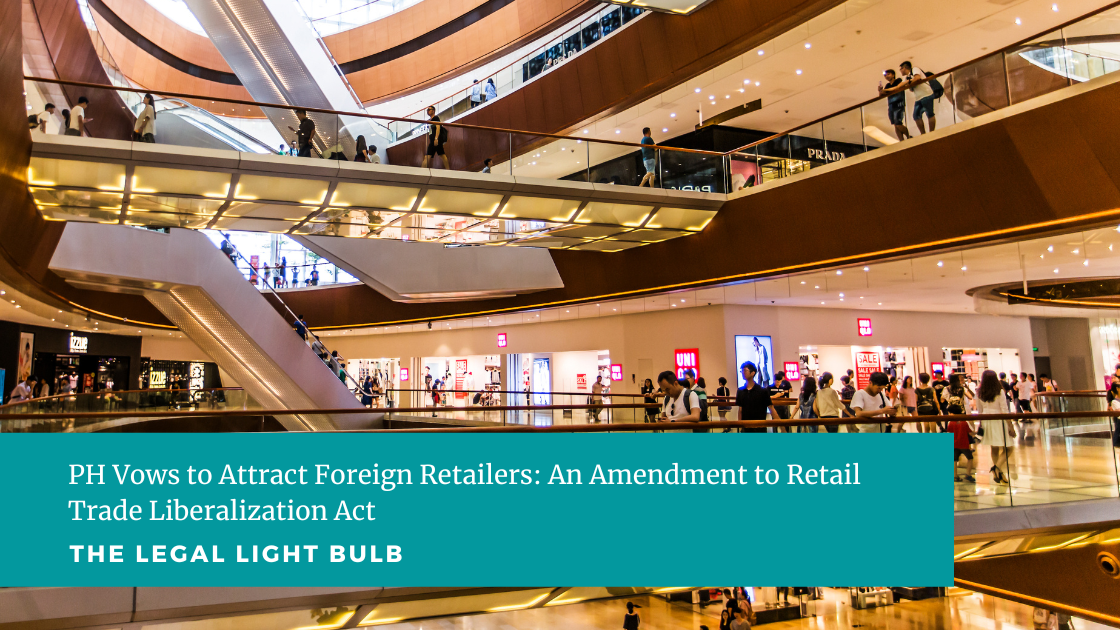The Philippines with its vast and exponential growth in its retail industry welcomes the entry of more foreign retailers through the recent amendments to the Retail Trade Liberalization Act.
Signed by then-President Rodrigo Duterte on December 20, 2021, the amendments would not only globally expand foreign enterprises but also meant to encourage investment inflows and create more jobs locally.
Clients would usually inquire about the process of expanding their market in the Philippines, may it be on technology, pharmaceutical, food and beverages, and the like. But this establishment and expansion, like any other, would require the rigid application of Philippine Laws.
The pertinent Retail Industry requires familiarization with the salient features of the amendments to RTLA, which are as follows:
1. Reduces the minimum paid-up capital requirement
Prior amendments, foreign retailers must comply with the minimum paid-up capital of US$2,500,000 or 129 Million Pesos. The amended law paves the way for its reduction to $500,000 or (P25,000,000), which amount shall be maintained in the Philippines at all times.
2. Removes the requirement for a Certificate of pre-qualification
Previously, a five (5) year track record in retailing, minimum retail branches and minimum net worth of parent corporation are in need to qualify for putting up a foreign retail business in the Philippines. These are deleted provided that the country of foreign enterprise provides for the same benefit to Filipino retailers.
3. Lowers the investment required for each store owned by a foreign enterprise
Foreign retailers engaged in retail trade with more than one (1) physical store, can now maintain a minimum investment per store of at least Ten Million Pesos (P10,000,000) or about $200,000 from the previous $830,000.
4. Employment shall comply with the Philippine Labor Code
Foreign nationals may be employed in case of non-availability of competent, able, and willing Filipino citizens to work for the foreign retail enterprise.
5. Removal of offering equity in the stock exchange
The amended law deleted the requirement that when foreign ownership exceeds 80 percent of equity, they shall publicly offer a minimum of 30 percent of their equity in any stock exchanges in the Philippines. A foreign enterprise may now be privately owned.
6. Promotes locally manufactured products
The percentage of manufactured products that must be made in the Philippines is also deleted in the amended law. Today, foreign retailers are only encouraged to have a stock inventory of products that are made in the Philippines.
7. Change of regulatory agency
Foreign retailers which are foreign-owned partnerships, associations, and corporations must be registered and regulated by the Securities and Exchange Commission (SEC) or in the case of foreign-owned single proprietorships, the Department of Trade and Industry (DTI).
8. Liability of individuals
In the case of partnerships, associations, or corporations, the penalty will be imposed upon its partners, president, directors, general manager, and officers. If the offender is not a citizen of the Philippines, a deportation order shall be served. If the offender is a Filipino, dismissal or disqualification is proper.
NEDA Trade, Services and Industry Staff Director, Bien Ganapin, said in a forum organized by the British Chamber of Commerce in the Philippines that countries are interested in investing in the Philippines following the enactment of the new retail trade law.
“These are actual potential leads waiting for the law to be finalized. Japan, for, instance, they are interested in convenience store expansion and restaurants. Indonesia is interested in pharmaceutical, and China in food service and motor vehicle operations”, he said.
He added that South Korean companies are keen on bringing food franchises, investors from UAE are interested in medical equipment, and Denmark is bringing in quality footwear.
Truth to be told, while this relaxation accelerates the retail industry in the Philippines, it requires technical legal know-how, compliance, and correspondence to avoid penalties and violations on any future trading activities or business.





